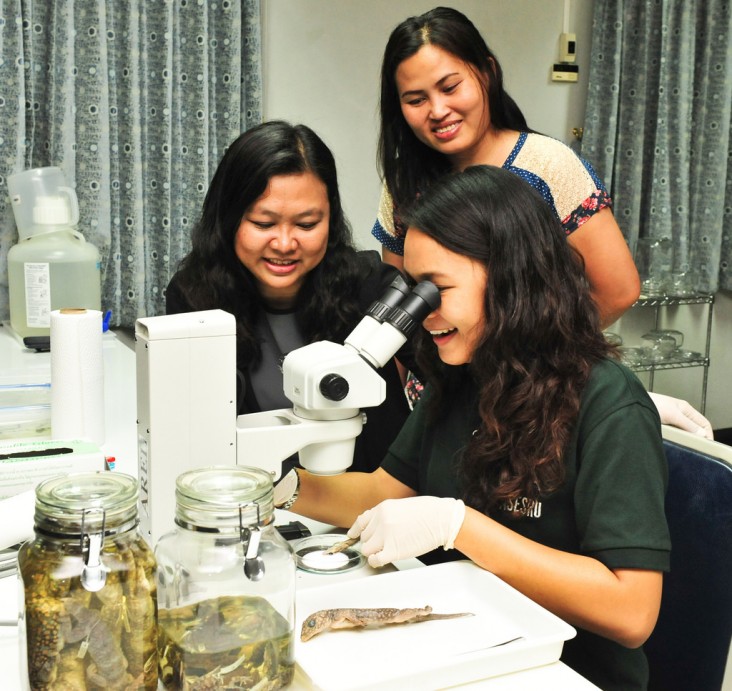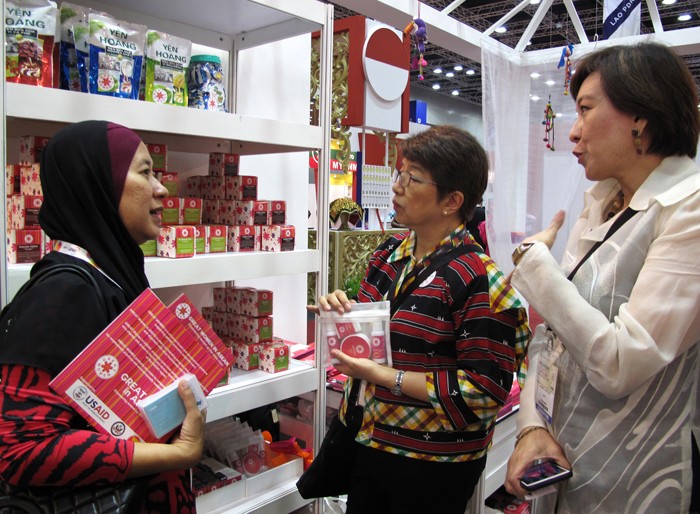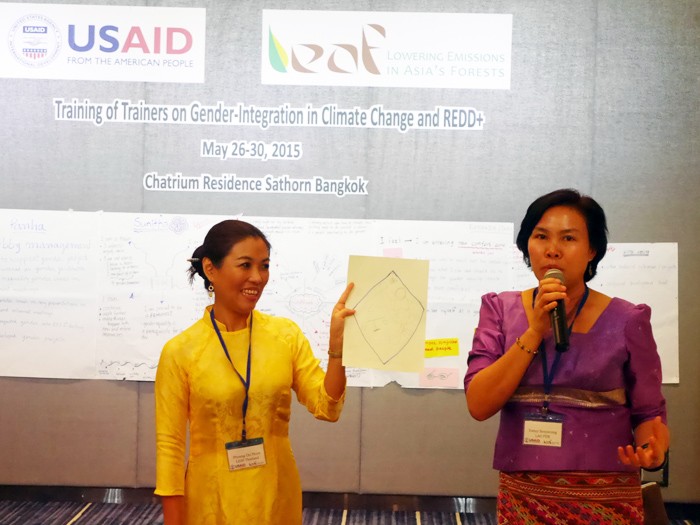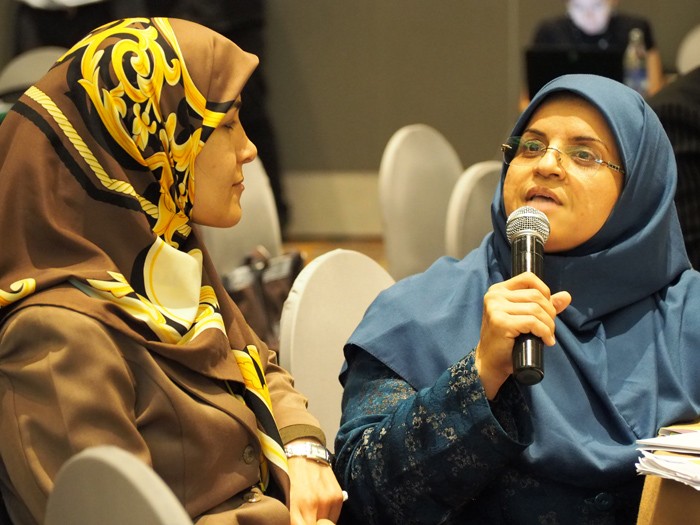
Promoting gender equality and advancing the status of women and girls is vital to achieving all development objectives of the United States Agency for International Development (USAID). USAID’s Regional Development Mission for Asia is committed to collaborating with a range of partners to bridge gender inequity gaps in all programming, with a particular emphasis on the following priorities:
- Advancing inclusive growth by strengthening women’s economic empowerment;
- Ending gender-based violence through programming for the most vulnerable populations, with a focus on violence prevention;
- Increasing women and girls’ voices in decision-making, leadership, and science, especially through innovative methodologies;
- Encouraging traditional and non-traditional partners to invest more financing and resources in programming to improve gender-based social outcomes.
As reported in the article, The Rise of Gender Capitalism, "investing with a gender lens can create financial and social impact by increasing women's access to capital, promoting workplace equity, and creating products and services that improve the lives of women and girls." To catalyze gender lens investing in Asia, USAID has partnered on an activity to document the range of stakeholders, identify a portfolio of opportunities, and facilitate dialogue on advancing the field. Click here to read the blog series “Gender Lens Investing in Focus: Insights from Asia” co-authored by Patty Alleman of USAID’s Regional Development Mission for Asia and Joy Anderson of Criterion Institute via Unreasonable.
To learn more, please contact Patty Alleman at palleman@usaid.gov
ADVANCING GENDER LENS INVESTING IN ASIA (2015)
Gender lens investing is focused on using gender data points to see opportunity and mitigate risk for better investment decisions. These include making money available to enterprises owned by women, focusing on workplace equity and employment opportunities for women, and investing in products and services that benefit women and girls. These investments can achieve financial results as well as gender-equitable social change. In this report, USAID and Criterion Institute identify the leaders in finance and gender who are active in current activity, and committed to pursuing the vast opportunities to continue advancement of the field of gender lens investing in Asia.
AN ONLINE GENDER SOURCEBOOK:
USAID developed an online Gender Sourcebook to help ensure that gender considerations and women’s empowerment are incorporated into large-scale climate change adaptation projects. Using the sourcebook can significantly help improve the status of women living in Asia and the Pacific. The online sourcebook enables project proponents to design gender responsive climate change adaptation measures as well as projects, particularly in developing countries, by providing targeted, sector-specific guidance and real-life examples that are easy to follow and navigate on laptops and mobile devices.
Learn more about the Online Sourcebook for Integrating Gender in Climate Change Adaptation Proposals
WHAT DOES GENDER EQUITY MEANS IN FOREST AND CLIMATE CHANGE?
USAID GREEN Mekong and Lowering Emissions in Asia’s Forests (USAID LEAF) programs together produced a video on gender equity in the forests and climate change in the Mekong region. The animation together with field and interview footages explains gender equity in context of forests and climate change initiatives. It illustrates the key aspects of gender equity – fairness. A gender equitable approach means that men and women are treated fairly, they have equal rights and representation, both participate in decision making and receive a fair share of benefits and costs. Watch the video here
HIGHLIGHTED PAST EVENTS
Launch of the GREAT Women in ASEAN initiative

Women entrepreneurs from around the Association of Southeast Asian Nations (ASEAN) region on May 27, 2015 launched the Gender Responsive Economic Actions for the Transformation of women (GREAT Women) in ASEAN initiative to promote their products for greater sales and business growth that can employ more workers and improve livelihoods. The GREAT Women in ASEAN launch is a main feature of the ASEAN SME Showcase and Conference 2015, at the Kuala Lumpur Convention Center.
The GREAT Women in ASEAN initiative is helping small and medium-sized enterprises (SMEs) led by women to sell their products beyond their own countries’ borders and protect their products’ intellectual property rights from being illegally copied and sold. Initial product categories in the initiative include food items and spices, textiles and silk-based goods and high-fashion jewelry and accessories that are manufactured under fair labor and trade standards.
Read the opening remarks by U.S. Ambassador to ASEAN, Nina Hachigian here
Effective Gender Integration into Climate Change and REDD+

Twenty-four gender champions from six countries and 21 organizations met in Bangkok from May 26 to 30, 2015, in the fourth of a series of workshops under the USAID LEAF Asia Pacific Leadership Initiative on Gender, Climate Change and Reducing Emissions from Deforestation and Forest Degradation (REDD+). These sessions focus on how to effectively integrate gender into climate change activities and this latest workshop focused on improving communication and training-of-trainers skills, building on strategic planning and negotiation skills developed in previous sessions. Participants shared success stories and best practices on integrating gender perspectives in climate change mitigation strategies. “I am always looking for areas where I can integrate gender into our initiatives to ensure long term reductions in greenhouse gas emissions,” said Ratchada Arpornslip, country program coordination officer for the Center for People & Forests. “It is critical that women involved in decision-making and policy development processes have sufficient information and participation skills,” said Patty Alleman, USAID Asia Senior Gender Advisor.
Watch the video on USAID LEAF Gender and Climate Change Champions here
Regional Workshop on Women's Participation in Local Governance

USAID's Regional Development Mission for Asia (RDMA) supported a Regional Workshop on Women's Participation in Local Governance in Bangkok, Thailand from November 17-19, 2014. The workshop brought together approximately 120 women politicians and political leaders, local government officials, and civil-society leaders active in government oversight and policy making from approximately 20 countries in the Asia Pacific region. The workshop was co-organized by a Steering Committee consisting of members from the United Nations Development Program UNDP) Asia-Pacific Regional Hub, USAID/RDMA, and the USAID Sapan Program. UNDP and USAID country offices in the Asia-Pacific region and other United Nation partners also actively contributed to successful implementation of the workshop.
At the workshop, participants: discussed the “Gender Equality: Women's Participation and Leadership in Governments at the Local Level Asia and the Pacific 2013” report; identified and prioritized strategies for institutional reform measures and capacity development for women's leadership in government and civil society, and discussed best practices, options and strategies for improving key aspects of women participation in local governance, including the impact of electoral systems. They also created a monitoring and evaluation framework and methodology for measuring effectiveness of women participation in governance; gender-sensitive budgeting; and the role of the political environment and its impact on women leadership on the local level; and identified concrete opportunities for enriched region-wide co-operation, exchange of knowledge, experiences and best practices and cross-fertilization of efforts for enhancing women participation in local governance.
For more information, contact Erin Doss, edoss@usaid.gov,USAID/RDMA/Office of Governance and Vulnerable Populations.
To access the UNDP's Gender Equality report or learn more about the workshop proceedings, please follow this link to the UNDP's website.







Comment
Make a general inquiry or suggest an improvement.